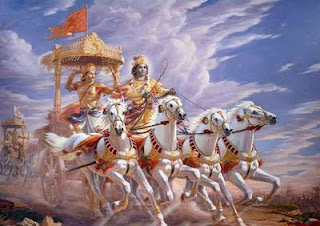
EVERYTHING was ready for the
battle to begin. At this tense moment, both armies saw with amazement
Yudhishthira, the steadfast and brave son of Pandu, suddenly doff his armor and
put away his weapons. Descending from his chariot, he proceeded on foot towards
the commander of the Kaurava forces. "What is this that Yudhishthira is
doing?" asked everyone and was puzzled by this sudden and silent
proceeding on the part of the Pandava. Dhananjaya too was perplexed and he
jumped down from his chariot and ran to Yudhishthira. The other brothers and Krishna also joined.
They feared that perhaps
Yudhishthira, surrendering to his natural inclination, had suddenly decided to
seek peace on any terms and was going forward to announce this. "King, why
are you proceeding to the enemy's lines in this strange manner? You have told
us nothing. The enemy is ready for battle, their soldiers sheathed in armor and
with uplifted weapons. But you have doffed your armor and thrown aside your
weapons and are proceeding forward, unattended and on foot. Tell us what you
are about." Thus said Arjuna to Dharmaputra. But Yudhishthira was immersed
in deep thought and proceeded forward silently. Then Vasudeva, who knew the
hearts of men, smiled and said: "He is going to the elders to ask for
their benediction before commencing this terrible fight. He feels it is not
right to start such a grave proceeding without formally taking such benediction
and permission. He goes to the grandsire to take his blessing and that of
Dronacharya. So he goes unarmed. It is right that he does this. He knows
proprieties. It is only thus that we might fare well in this battle."
The men in Duryodhana's army,
when they saw Yudhishthira advancing with hands clasped in humble attitude,
thought: "Here is the Pandava coming to sue for peace, frightened at our
strength. Truly this man brings disgrace to the race of kshatriyas. Why was
this coward born among us?" Thus did they talk among themselves reviling
Dharmaputra though delighted at the prospect of securing victory without a
blow. Yudhishthira went through the lines of soldiers armed from head to foot
and proceeded straight to where Bhishma was and, bending low and touching his
feet in salutation, said: "Grandsire, permit us to begin the battle. We
have dared to give battle to you, our unconquerable and incomparable grandsire.
We seek benediction before beginning the fight."
"Child," replied the
grandsire, "born in the race of Bharatas, you have acted worthily and
according to our code of conduct. It gives me joy to see this. Fight and you
will have victory. I am not a free agent. I am bound by my obligation to the
king and must fight on the side of the Kauravas. But you will not be
defeated." After thus obtaining the permission and the blessings of the
grandsire, Yudhishthira went to Drona and circumambulated and bowed, according
to form, to the acharya, who also gave his blessings, saying: "I am under
inescapable obligations to the Kauravas, O son of Dharma. Our vested interests
enslave us and become our masters. Thus have I become bound to the Kauravas. I
shall fight on their side. But yours will be the victory." Yudhishthira
similarly approached and obtained the blessings of Kripacharya and uncle Salya
and returned to the Pandava lines.
The battle began, commencing with
single combats between the leading chiefs armed with equal weapons. Bhishma and
Partha, Satyaki and Kritavarma, Abhimanyu and Brihatbala, Duryodhana and Bhima,
Yudhishthira and Salya, and Dbrishtadyumna and Drona were thus engaged in great
battles. Similarly, thousands of other warriors fought severally according to
the rules of war of those days.
Besides these numerous single
combats between renowned warriors, there was also indiscriminate fighting among
common soldiers. The name of "sankula yuddha" was given to such free
fighting and promiscuous carnage. The Kurukshetra battle witnessed many such
"sankula" fights wherein countless men fought and died in the mad
lust of battle. On the field lay piles of slaughtered soldiers, charioteers,
elephants and horses. The ground became a bloody mire in which it was difficult
for the chariots to move about. In modern battles there is no such thing as
single combats. It is all "sankula." The Kauravas fought under Bhishma's
command for ten days. After him, Drona took the command. When Drona died, Karna
succeeded to the command. Karna fell towards the close of the seventeenth day's
battle. And Salya led the Kaurava army on the eighteenth and last day. Towards
the latter part of the battle, many savage and unchivalrous deeds were done.
Chivalry and rules of war die hard, for there is an innate nobility in human
nature. But difficult situations and temptations arise which men are too weak
to resist, especially when they are exhausted with fighting and warped with
hatred and bloodshed.

No comments:
Post a Comment